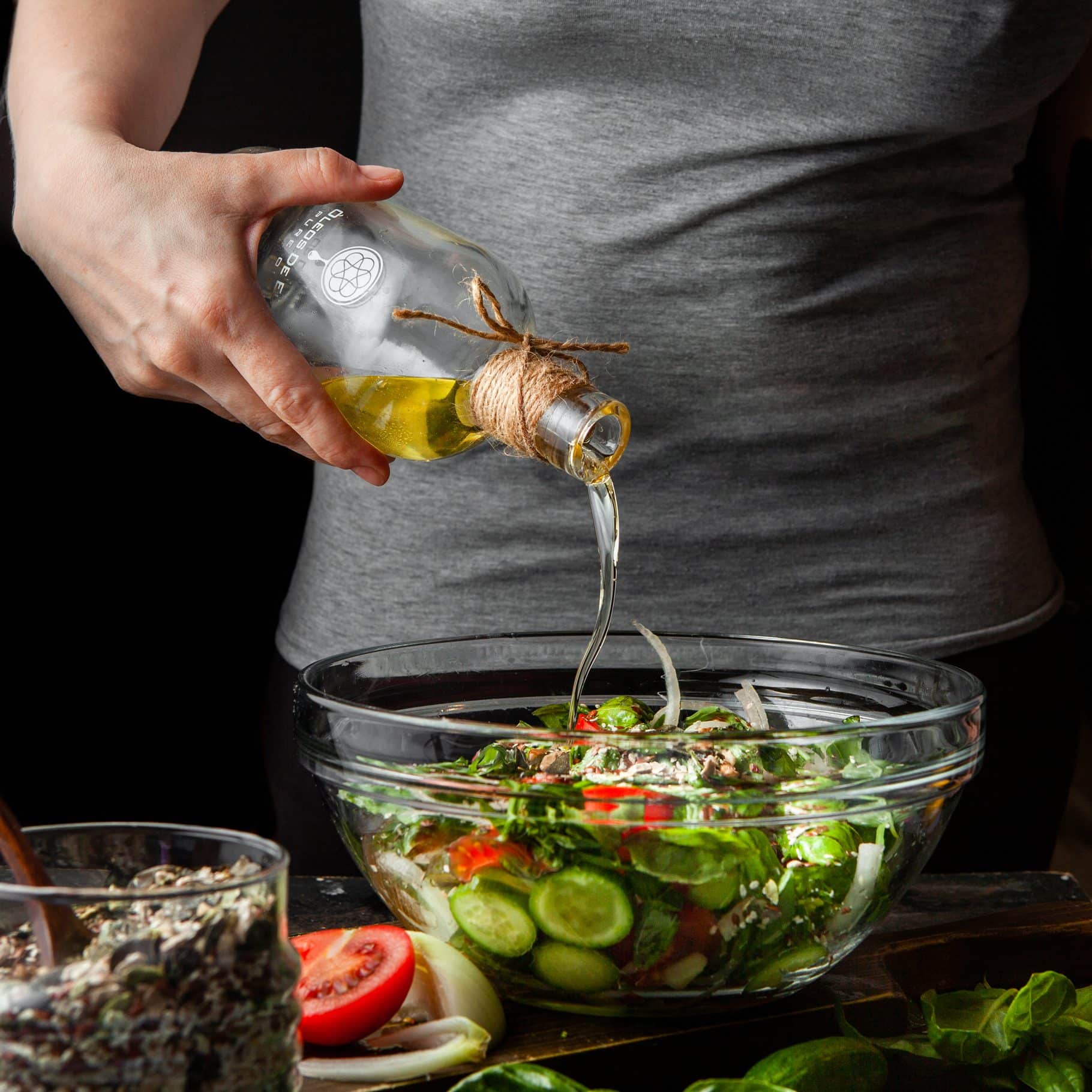Known for its rich flavor, versatility and health benefits, extra virgin olive oil is a must-have in any kitchen cupboard.
Not only is it easy to use for frying, frying, baking or sautéing, but it's also packed with antioxidants and heart-healthy fats.
Additionally, its numerous health benefits have been extensively studied. Some research suggests it may protect against heart disease, fight cancer, and reduce inflammation.
This article takes a closer look at the potential benefits, disadvantages, and uses of extra virgin olive oil, as well as how it compares to other common cooking oils.
What is olive oil and how is it made?
Olive oil is a type of oil extracted from olives, the fruit of the olive tree.
The manufacturing process is simple. Olives can be pressed to extract their oil, but modern processes involve crushing the olives, blending them, and then separating the oil from the pulp in a centrifuge (1).
After centrifugation, small amounts of oil remain. The remaining oil can be extracted with chemical solvents and is called olive pomace oil (2).
There are different types of olive oil that differ in terms of their nutritional content and the level of processing.
The three main types of olive oil are:
- refined olive oil
- native olive oil
- extra virgin olive oil
Extra virgin olive oil is the least processed variety and is often considered the healthiest olive oil. It is extracted using natural methods and tested for purity and certain sensory properties such as taste and smell (3).
In addition to its unique taste and aroma, extra virgin olive oil is rich in disease-fighting antioxidants and has been linked to a wide range of potential health benefits (4).
ZUSAMMENFASSUNG
Modern olive oil is made by crushing the olives and separating the oil from the pulp in a centrifuge. Extra virgin olive oil is the least processed variety and is high in antioxidants.
Nutrient composition of extra virgin olive oil
Extra virgin olive oil is high in heart-healthy fats, as well as vitamins E and K.
A tablespoon (about 14 grams) of olive oil contains the following nutrients (5):
Calories: 119
Saturated fats: 14% of total calories
Monounsaturated fats: 73% of total calories (mainly oleic acid)
Polyunsaturated Fats (PUFA): 11% of total calories
Vitamin E: 13% of the daily value (DV)
vitamin K: 7% of the daily requirement
Extra virgin olive oil is an excellent source of antioxidants, that is, compounds that fight inflammation and chronic disease (6, 7).
The oil's most important antioxidants include the anti-inflammatory oleocanthal and oleuropein, a substance that protects the (bad) LDL cholesterol from oxidation (8).
Some people criticize that olive oil has a high omega-6 to omega-3 ratio. However, the total amount of polyunsaturated fat is relatively low, so you probably don't have to worry (5).
What makes you so healthy?
In addition to its impressive antioxidant levels, extra virgin olive oil is high in monounsaturated fat, a type of healthy fat that's been linked to several benefits.
In particular, research suggests that monounsaturated fat may promote heart health and even protect against heart disease (9, 10, 11).
Extra virgin olive oil also packs a good amount of vitamins E and K in each serving. Vitamin E is an essential nutrient that also acts as an antioxidant, while vitamin K plays an important role in bone health, blood clotting, heart health, and more (12, 13).
ZUSAMMENFASSUNG
Olive oil is very high in monounsaturated fat and contains modest amounts of vitamins E and K. Extra virgin olive oil is also high in antioxidants, some of which have major health benefits.
Extra virgin olive oil contains anti-inflammatory substances
Chronic inflammation is thought to be a leading cause of many diseases, including heart disease, cancer, metabolic syndrome, type 2 diabetes and arthritis.
Some suspect that olive oil's ability to fight inflammation is responsible for many of its health benefits.
Oleic acid, the main fatty acid in olive oil, has been shown to lower inflammatory markers such as C-reactive protein (CRP) (14).
However, the oil's anti-inflammatory effects appear to be largely due to its levels of antioxidants such as oleacein and oleocanthal, which appear to significantly reduce inflammation in test-tube and animal studies (15, 16).
Interestingly, several studies have found that regular olive oil consumption may be associated with lowering certain inflammatory markers such as CRP and interleukin-6 (17, 18).
However, it is important to remember that chronic, low-level inflammation is usually mild and can take years or decades to cause damage. More human studies are needed before we can make any conclusions about olive oil's ability to fight inflammation.
Still, as a regular part of the diet, extra virgin olive oil could protect against long-term damage and reduce the risk of various inflammatory diseases, including heart disease.
ZUSAMMENFASSUNG
Olive oil contains oleic acid and antioxidants that may help fight inflammation. This could be the main reason for the health benefits of olive oil.
Extra virgin olive oil and heart disease
Cardiovascular diseases such as heart disease and stroke are among the leading causes of death in the world (19).
However, many observational studies show that the number of deaths from these diseases is low in certain regions of the world, particularly Mediterranean countries where olive oil is an important part of the diet (20).
This observation has sparked interest in the Mediterranean diet, which aims to mimic the diet of people in this region (21).
Studies on the Mediterranean diet consistently show that it is associated with improved heart health and may help prevent heart disease and stroke (22).
Extra virgin olive oil protects against heart disease through numerous mechanisms:
- Reduces inflammation. Olive oil may reduce inflammation, which is a leading cause of heart disease (23, 24).
- Reduces the oxidation of (bad) LDL cholesterol. Olive oil may protect LDL particles from oxidative damage, an important factor in the development of heart disease (25).
- Improves blood vessel health. Olive oil may improve the function of the endothelium, which is the lining of blood vessels (18, 26).
- Helps in blood clotting. Some studies suggest that olive oil may help prevent unwanted blood clotting, which can contribute to heart attacks and strokes (27).
- Lowers blood pressure. Research suggests that increased consumption of olive oil may be associated with lowering blood pressure, which may help prevent heart disease (28, 29).
Given the numerous health benefits associated with olive oil, it's not surprising that many studies show that increased consumption may even be associated with a reduced risk of heart disease and stroke (30, 31, 32).
ZUSAMMENFASSUNG
Olive oil can improve several aspects of heart health. Studies show that it can lower blood pressure and inflammation, protect LDL particles from oxidation, improve blood vessel health, and prevent unwanted blood clotting.
More Health Benefits of Extra Virgin Olive Oil
Although olive oil has been studied primarily for its effects on heart health, its consumption has also been linked to a number of other health benefits.
Olive Oil and Crab
Studies have shown that people living in Mediterranean countries have a relatively low risk of cancer, which may be due in part to consuming anti-inflammatory ingredients, including olive oil (33).
One possible factor in the development of cancer is oxidative damage from harmful molecules called free radicals. However, extra virgin olive oil is rich in antioxidants that reduce oxidative damage (6).
Oleic acid in particular is very resistant to oxidation and has been shown in some test tube studies to slow the growth and spread of cancer cells (34, 35).
According to a 2011 study, regular olive oil consumption may also be associated with a lower risk of breast or digestive system cancer (36).
Still, newer, high-quality research is needed to understand the effects of olive oil on cancer when enjoyed as part of a healthy, balanced diet.
Olive oil and Alzheimer's disease
Alzheimer's disease is the world's most common neurodegenerative disease and a major cause of dementia.
A feature of Alzheimer's disease is the accumulation of proteins known as amyloid beta plaques in certain neurons of the brain (38).
Animal studies have found that extra virgin olive oil and some of the compounds it contains may help preserve brain function by preventing the deposition of these proteins (39, 40).
Additionally, some studies show that a Mediterranean diet, which is typically high in olive oil, may also be associated with a lower risk of dementia and cognitive impairment (41, 42).
ZUSAMMENFASSUNG
Preliminary evidence suggests that olive oil may help fight cancer and Alzheimer's, although further human studies are yet to confirm this.
Extra Virgin Olive Oil vs. Other Oils
In addition to extra virgin olive oil, there are many other popular cooking oils, including regular olive oil, canola oil, vegetable oil, avocado oil, and coconut oil.
Here's a closer look at how extra virgin olive oil compares to these other types of oil (5, 43, 44, 45, 46, 47, 48):
| Basics | Taste | Nutrient composition | You use | Smoke point | |
| extra virgin olive oil | made from cold-pressed olives | strong, olive-like flavor | • 119 calories/tablespoon (14 grams) • 73% MUFA • 11% PUFA • 14% saturated fat | • stir-frying • sautéing • salad dressings • marinades • finishing oil | 405°F (207°C) |
| Regular olive oil | derived from olives through mechanical or chemical means | mild, neutral flavor | • 119 calories/tablespoon (14 grams) • 67% MUFA • 10% PUFA • 16% saturated fat | • stir-frying • sautéing • grilling • baking • frying • marinades | 406°F (208°C) |
| canola oil | extracted from rapeseed using chemical solvents | neutral flavor | • 124 calories/tablespoon (14 grams) • 63% MUFA • 28% PUFA • 7% saturated fat | • stir-frying • sautéing • grilling • baking • frying • marinades | 493°F (256°C) |
| vegetable oil | usually made from a blend of oils, including corn, soy, or sunflower oil | neutral flavor | • 124 calories/tablespoon (14 grams) • 42% MUFA • 41% PUFA • 14% saturated fat | • stir-frying • sautéing • grilling • baking • frying • marinades | 400°F (204°C) |
| avocado oil | extracted from cold-pressed avocado pulp | Mild and nutty flavor | • 124 calories/tablespoon (14 g) • 71% MUFA • 14% PUFA • 12% saturated fat | • stir-frying • sautéing • salad dressings • marinades • finishing oil | 520°F (271°C) |
| Coconut oil | derived from fresh or dried coconut meat or milk | • virgin coconut oil: tropical, coconut flavor • refined coconut oil: neutral flavor | • 121 calories/tablespoon (14 g) • 6% MUFA • 2% PUFA • 83% saturated fat | • stir-frying • sautéing • baking • frying | 376°F (191°C) |
ZUSAMMENFASSUNG
There are different types of cooking oils that differ in terms of taste, nutritional value, usage and smoke point.
Can you cook with it?
Fatty acids can oxidize during cooking, which means they react with oxygen and become damaged.
The double bonds in the fatty acid molecules are primarily responsible for this.
Because of this, saturated fats — which don't have double bonds — are heat-stable. On the other hand, polyunsaturated fats, which have many double bonds, are more sensitive and can be damaged (49).
Olive oil mainly contains monounsaturated fatty acids that have only one double bond. Therefore, olive oil is quite resistant to moderate heat (49).
In a 2007 study, researchers heated extra virgin olive oil to 36°C (180°F) for 356 hours and found that the oil was very resilient (50).
A 2017 report found that olive oil was comparable or better than other vegetable oils for frying food at temperatures of 180-190 °C (356-374 °F) (51).
Overall, olive oil appears to be very safe, even when cooking at moderate temperatures.
ZUSAMMENFASSUNG
Olive oil is fairly heat resistant and safe to use for cooking.
Risks of extra virgin olive oil
Like other types of fat, extra virgin olive oil is high in calories, with about 119 calories per tablespoon (14 g) (5).
If you consume more calories than you burn each day, you will gain weight over time (52).
So unless you're making other dietary changes, consuming large amounts of olive oil could make it more difficult to maintain a moderate weight.
Also, while rare, some people can be allergic to olives and olive oil. If you experience symptoms of an allergic reaction after consuming olive oil, you should stop using it and consult a doctor (53).
ZUSAMMENFASSUNG
Olive oil is high in calories and can contribute to weight gain when consumed in large amounts. Some people can also be allergic to olives and olive oil.
Frequently asked questions
Is it okay to cook with extra virgin olive oil?
Olive oil is mostly composed of monounsaturated fats that are stable at moderate heat (49).
It also has a relatively high smoke point, making it a good choice for many cooking methods, including roasting, grilling, baking, and sautéing (48).
Can you substitute extra virgin olive oil with other oils in cooking?
For most recipes, you can easily substitute other oils, such as vegetable oil, coconut oil, or canola oil, for the same amount of extra virgin olive oil.
However, keep in mind that extra virgin olive oil often has a particular flavor and aroma, so it can slightly alter the taste of the final product.
Is Extra Virgin Olive Oil Healthy?
Extra virgin olive oil is high in heart-healthy fats and antioxidants, making it a great addition to a nutritious diet (6).
It's also been linked to a long list of benefits, and may protect against inflammation, heart disease, breast cancer, and type 2 diabetes (54).
Can Olive Oil Reduce Belly Fat?
Several studies have found that a diet enriched with olive oil can be beneficial in weight management and even help reduce body fat (55, 56).
Although olive oil can help with weight management, it is important to remember that oil is very high in calories.
For this reason, you should replace it with other fats in your diet and consume it in moderation to maximize the potential benefits.
Can I use extra virgin olive oil on my face?
Olive oil is widely used as a natural skin care product. It can be applied directly to the face, either alone or in combination with other ingredients such as honey or egg yolk.
In addition to moisturizing the skin, some research suggests that olive oil may reduce inflammation, promote wound healing, and slow skin aging (57).
However, be sure to wipe off excess oil to avoid clogging pores and always do a patch test before applying anything directly to your face.
The bottom line
In addition to being high in heart-healthy fats, extra virgin olive oil is an excellent source of antioxidant compounds like vitamin E, oleacein, and oleocanthal.
Associated with a variety of health-promoting properties, olive oil may help prevent heart disease, boost brain function, and protect against certain types of cancer.
Plus, it's incredibly versatile, making it great for a variety of recipes, from baked goods to stir-fries, roasted veggies, salad dressings and more.
just one thing
Try this today: One of the easiest ways to increase your extra virgin olive oil intake is to drizzle cooked dishes with olive oil. Use it to boost the flavor and health benefits of roasted vegetables, cooked meats, pasta dishes and more.



